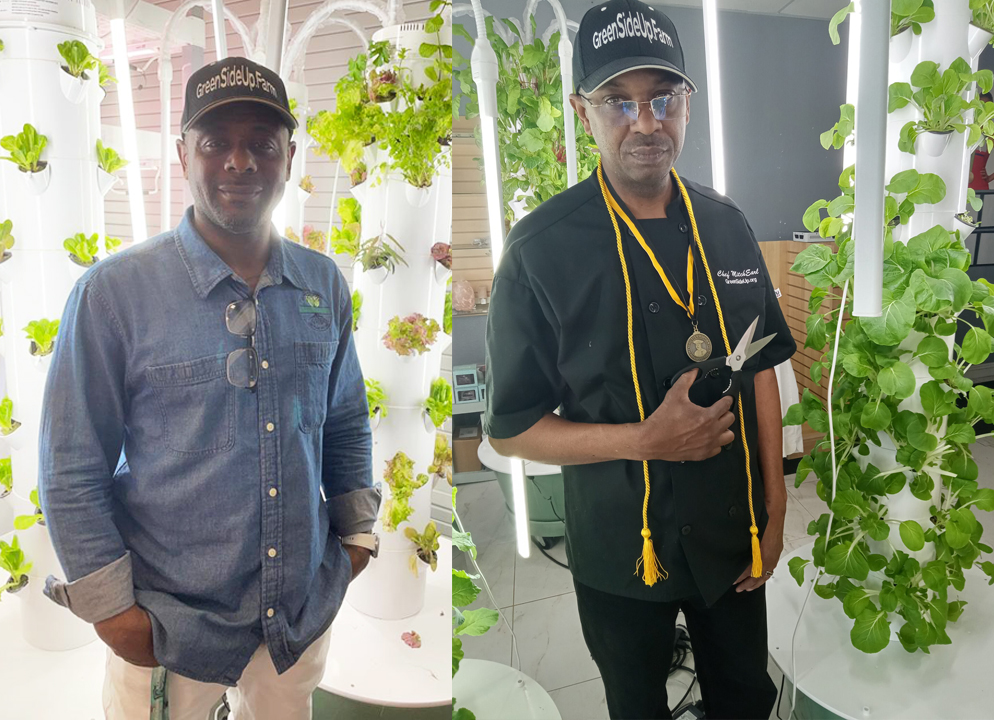Kairospace Technologies is proud to announce its collaboration with Las Vegas business, Green Side Up Farms, LLC
Having conducted various feasibility studies on converting local urban spaces for vertical farming, Green Side Up Vertical Farms work with local community, Nevada Partners and Culinary Academy, Las Vegas to combat inner-City food deserts. Community leaders Alaric Overbey and Chef Mitch Earl started Green Side Up to focus on providing local produce to consumers & businesses that do not have access to a consistent supply of fresh & healthy vegetables.
Kairospace focuses on addressing current water-related issues by uniquely developing clean-tech water solutions that address specific water challenges while generating positive environmental and economic impact across water reliant industries. Regenerative water treatment products, called “AG-PACKs”, provide the ultimate water enhancement platform for Ag growers. By combining physics, gases, and nanobubbles in complementary ways, AG-PACKs optimize and conserve water to increase agricultural outputs, improve crop quality and cut costs.
The collaboration’s initial focus will be the transfer of innovative water equipment and knowledge for advancing regenerative infrastructure in indoor vertical farming within Southern Nevada communities.

Alaric Overbey and Chef Mitch Earl of Green Side Up Farms, lead a diverse team ranging from chefs to agricultural experts
What’s A Food Desert?
Food deserts are geographical areas where access to affordable, healthy food is scarce due to grocery stores, farmer’s markets, or community gardens being further than a 1-mile radius or nonexistent. Usually associated with low-income communities, these regions have little access to nutritious foods and rely on fast food or convenience stores for their access to foods. In Nevada, 154,623 citizens qualify as living in a food desert. The USDA has identified 40 of 687 census tracts as food deserts.
The Solution to Food Deserts
As Vertical farms can be scaled, they can be established in food desert areas to provide fresh and healthy food locally, at minimal cost to consumers. Growing produce locally reduces nutrient loss during transport and reduces contamination risk. Vertical farming, if done correctly, can be a healthy and sustainable solution to those that live in food desert areas. Vertical farming tackles inefficiency in production by growing healthy food with less water, near to where it’s sold. Reducing “Food Miles”, along with the greenhouse gas emissions related to long distance distribution.
Water in the food desert
Water is the most important natural resource on the planet. It is essential for life and used in a wide variety of industries, from agriculture to manufacturing. However, the world is facing a growing Water Stress crisis. Climate change, population growth, urbanization, over-extraction of water resources and pollution are the main contributors to a growing shortage of clean, accessible water in desert regions. Water Stress in Southern Nevada poses a risk to human health, food security, and economic stability. Drought and climate change have caused Lake Mead to drop about 170 feet. The federal government recently issued a tier two water shortage declaration, reducing the amount of water Southern Nevada can draw from the lake. The Southern Nevada Water Authority is asking everyone to help protect and extend the community’s primary water supply by limiting and conserving water use. By supporting local businesses in water conservation, the Kairospace water solutions will play a key role in expanding equity and promoting sustainable development in desert regions.
Visit:



